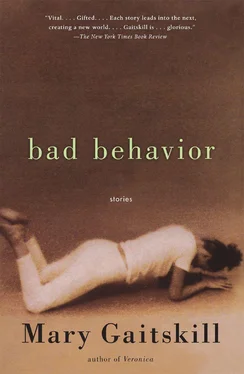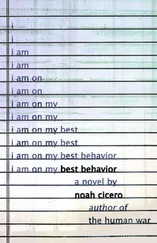There were more of these calls and Susan began to resent them, particularly because when Susan needed someone to talk to Leisha would not return her calls. Leisha was too upset, it seemed, to do anything but fight with the musician, but she liked having Susan available as a witness. Susan felt like an accessory, especially when Leisha invited her to a dinner party that ended with Leisha and the musician flinging pasta and otherwise slugging it out while a plump drummer tried vainly to separate them. Eventually he left her for the singer again and Leisha began seeing someone else. Sometimes the three of them would go out, but the evenings would invariably conclude with Leisha drunk in a phone booth, screaming at the musician’s answering machine while her new boyfriend stared into space.
The really annoying thing about this was that just as Susan was getting ready to tell Leisha that she was feeling used, Leisha told her that she felt Susan only called her when she was depressed. Susan was flabbergasted and outraged, and so was Leisha when Susan told her why. They didn’t speak for almost a year. It was apparently during this time that Leisha finally got rid of the musician and began dating the lawyer.
The friendship resumed when they ran into each other on the street and found that they couldn’t stop talking. They began having lunch. Leisha grimaced and shrugged her shoulders and said “I don’t know” a lot when she talked about her acting. She said that she wanted to have a baby. When they walked down Eighth Street she would say, “Oh, don’t you hate these people with their standard-issue green hair standing straight up?”
“No,” said Susan.
“But it is so passé, I mean, can’t they do anything else?”
“I think teenagers need these things.”
Susan refrained from pointing out that barely a year ago Leisha’s hair also had stood straight up, but soon they argued about other things.
“We have to talk,” said Susan, and they met in a cappuccino bar frantically decorated with annoying statuettes and candelabras.
“I feel drained by you,” said Leisha. “Every time I’m around you I feel like you’re hanging on to me, that there’s something you want and I don’t know what it is, and I can’t stand it.”
“I don’t know what you’re talking about. All I want from you is friendship. If you feel drained by that, there’s nothing I can do.”
“Maybe some of this is old stuff, because you seem more positive now than you did before, but I still feel the effects of those phone conversations we used to have when you would call me and say that you felt like dying.”
“Wait a minute. Don’t you remember when you’d call me at six A.M. and tell me that I had to come over right away or you were going to kill yourself?”
“You used to tell me that you didn’t see how people could stand to live. Any people.”
“Oh, Jesus Christ, this is stupid. Who was the one who started all those depressing conversations, Leisha? You did, after—” She started to say “you went into Bellevue” and couldn’t.
“I’m not saying it was all your fault, and don’t try to tell me it was all mine, because it wasn’t. It was this strange dynamic that somehow got started between us. We got turned into these sob sisters and I don’t know how it happened. I don’t know what happened to us, Susan. It was never like that in Ann Arbor.” Leisha’s round eyes were full of an unreadable emotion.
“I didn’t mind giving you support,” said Susan. “But it was always the same thing, always Eddie and you. It didn’t matter what I said, you never listened to me anyway. And if you didn’t want to talk about Eddie, you never called just to talk to me. You wouldn’t even return my calls. You even got Eddie to tell me you weren’t home when you were. He told me.”
“Oh, Susan, I was sick then, don’t you understand? I slit my wrists, remember? I was a sick, worthless piece of shit.” Her voice faltered; Susan recognized the prelude to tears.
“You weren’t a piece of shit,” mumbled Susan.
“And anyway, I feel like you’re doing the same thing to me now.”
“What?”
“All we ever talk about is you. You don’t seem interested in my relationship with Jonathan or my wedding or my therapy. Those are the things I’m doing in my life. I’m trying very hard to get well and to have a good relationship and get married.” Her voice became a tremulous squeak, tears appeared, her face crumpled delicately and she pecked at it with her napkin.
Susan scowled at her cold cup of chamomile tea. She couldn’t bring herself to say that she despised Jonathan, that she thought their relationship was a farce, that she hated traditional weddings and that she thought Leisha used therapy the same way she had used Eddie — to distract herself from her own life. A wave of classical music surged through the room, loudly enough to knock over a table, aggressively soothing the eaters of cannoli and cute cakes.
“And the way you talk about Stef all the time—”
Stef was the man Susan had met in a public rest room. “I don’t talk about Stef all the time.”
“It seems like you do. And what you say is so horrible, even if you talk about him a little it’s a lot.”
How could we have pretended to be friends for so long, Susan thought.
“Especially when you talk about him and that Italian girl, it’s so awful it makes me hurt inside. Don’t you see how they’re using you?”
“They’re not using me,” Susan said stiffly.
“Oh no, what about the time they tried to shoot you up in the bathroom at Area, or wherever the fuck you were?”
“They didn’t shoot me up.”
“They tried.”
“Not very hard, obviously. Anyway, it doesn’t matter if they’re using me, I don’t care. I’m doing this thing with them because I want to. I can take care of myself, and I’m not trying to make you a part of it.”
“But when you tell me stories like that nipple-piercing thing, you are making me part of it. Why do you put yourself in positions where you have to take care of yourself?”
They stared at each other with what seemed painfully close to hate. A raw feeling traveled up Susan’s throat. She was sweating.
Leisha spoke slowly and deliberately. “I think you’re involved with them because you don’t have anything else to do. I think you think it’s interesting .” This last word was sarcastic enough for two or three words. “And it’s not interesting at all. It is sordid and disgusting.” Her nostrils dilated.
“How dare you?” said Susan. “How dare you judge me?”
Susan opened her eyes and contemplated the maniacal outline of a feathered hat hanging on Bobby’s coatrack. In retrospect she had to admit that part of her anger had come from the element of truth in Leisha’s last accusation. But Stef and Anna had been interesting to her at the time; and anyway, how dare she indeed?
Susan turned over in bed. Their fantasies had changed, their tastes in props had diverged, and neither one could satisfy the other’s needs any longer. Since what they were inside didn’t matter, they separated. Susan had ended a chapter in her life, and doubtless it had felt the same to Leisha, who probably saw their friendship as a symbol of bad living and delusion. Leisha had sent Susan the engraved wedding invitation a week after their discussion. (“The honor of your presence is requested at the marriage of …”) Susan had said “How beautiful” to her empty apartment and summarily shredded the card.
Susan turned over again. Still, she wished she knew where Leisha was. She would like to talk to her. She remembered the time they had gone dancing one summer. They had danced for hours in a hot, damp place, until they collapsed in each other’s arms, Leisha’s small, sweating, palpitating chest pressed against hers. She remembered having the almost tangible sensation that they were creatures with delicate invisible feelers waving between them, sending tenderness and warmth from one to the other.
Читать дальше












